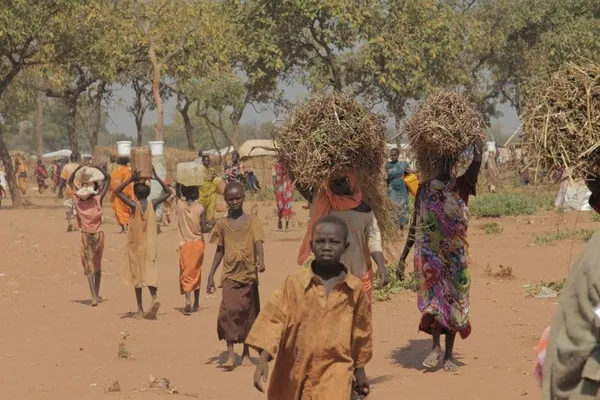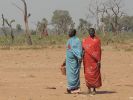Eye For Film >> Movies >> Beats Of The Antonov (2014) Film Review
Beats Of The Antonov
Reviewed by: Owen Van Spall

Hajooj Kuka’s documentary takes us into the heart of one of the world’s most protracted conflicts, raging today in one of world’s poorest regions. In June 2011, weeks before South Sudan gained independence from Sudan, a new war broke out in Sudan's Southern Kordofan state and quickly spread to the Blue Nile. This fighting, which has included indiscriminate aerial bombing in rebel-held and civilian areas, has forced hundreds of thousands to flee and set up refugee communities, often without basic services or protection.
It is into these communities of farmers, herders, and rebels displaced to the Blue Nile and Nuba Mountain regions that Hajooj Kuka has dived, his camera recording months of their lives within hillside hide-outs and refugee camps. But Kuka’s film surprises in that, although it does include harrowing handheld footage of ground combat and teeth-janglingly close shots of aerial bomb impacts, much of the running time is devoted to showing the rich cultural heritage of these communities and their diverse methods of expression. This is a film more interested in life than death, even if death is often hovering above.

Though every so often the camera will turn to the sky to show the titular Antonovos flying over on bombing runs (their name betrays their Soviet-era, Ukrainian origins), on the ground, communities are seen coming together for large communal dances, songs and celebrations, where artists and spectators seem to blur into one. The planes never seem to drive people into the shelters for long. Young women in particular are seen exerting their passions and creativity through a type of music colloquially called 'girls' music'.
Various refugees, artists and musicians, who significantly are always named on screen, offer up their thoughts of how Sudan got into this terrible situation, with much discussion on the aggression of the northern regions and the fracture points that occur at the intersection of ideas of Arab and African identities, and the uses and abuses of nationalism and religion. Many of the refugees and other talking heads are keen to stress, as one interviewee puts it, that here out in the fringes, they are showcasing an alternative and diverse Sudan, not the image of Sudan broadcast by the ruling government in Khartoum.
This is an illuminating, surprisingly uplifting film that gives a voice to one of the most marginalised communities on earth right now.
Reviewed on: 23 Mar 2015















